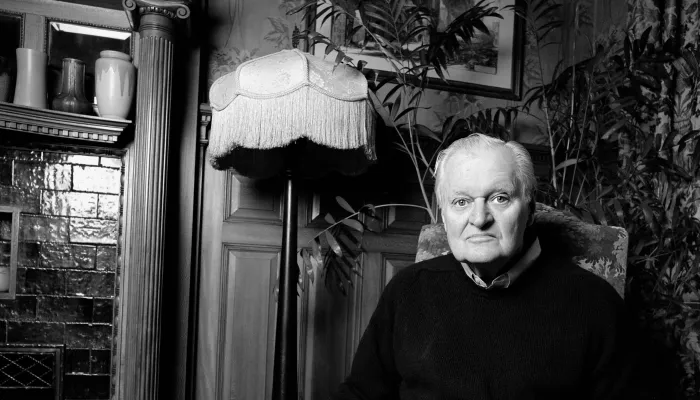Jacob Scheier
Biography
Jacob is a Governor General’s Award-winning poet from Toronto. His third full length collection Is This Scary? — which engages mental and chronic, physical illness — was published in spring 2021 with ECW Press. The book was noted as being "witty and affecting" by the Toronto Star. He specializes in poetry workshops on the topics of grief and disability. Jacob has been facilitating workshops and giving talks on poetry for high school students for over a decade, including being the former poet in residence at Madonna Catholic Secondary School, in Toronto, through Descant’s Writers in the Schools program. He has also facilitated writing workshops with Indigenous communities in Western Ontario and the Yukon.
He is most interested in writing out of personal experience, and particularly about being a psychiatric consumer-survivor, in the tradition of the confessional poets like Sylvia Plath and Robert Lowell. He is, additionally, interested in writing from a Disability Studies or ‘Crip’ perspective, and often incorporates humour in his poems — inspired by the wit of Leonard Cohen, Al Purdy and the New York School poets, such as Frank O’Hara.
Micro-interview
I very much did not like reading poetry through most of high school. I think this is because the poems we were given to read didn’t speak to my experience. But then I fell in love with the poetry that I discovered, on my own, in my late teens. The first poet I got really into was Leonard Cohen—this began, of course, with his music. But soon I devoured his writing—his poems and novels. I still have a very beaten up and tattered copy of his book Stranger Music: Selected Poems and Songs, which I took with me when I went backpacking in Europe and the Middle East quite a few years ago. I bought the book about twenty years ago. The very first poem of that book has always stayed with me. It’s from his first collection Let Us Compare Mythologies and the poem is simply called “Poem.” It’s maybe the only poem I’ve memorized that I’ve never forgotten how to recite—though it’s also only eight lines long. Like so many of his poems it is seemingly simple – the content is crystal clear—I still don’t like getting too confused about what is ‘going on’ in a poem. But there is so much silence and tension in "Poem", and most important of all—to me—vulnerability. My favourite line in the poem is “silence blossoms like tumours on my lips.”
I came to write poetry around the age of sixteen though I resisted it because my mother (Libby Scheier) was a published poet. Despite myself, it seems, I wrote poetry somewhat secretly in a journal. You might call what I wrote poems, but perhaps more accurately it ought to be called lyrics—very cringe-y lyrics. I am a little embarrassed to admit these early ‘poems’ were mostly inspired by late 90s goth music—like Nine Inch Nails. A couple years later, I would discover and become inspired by the poetry of Leonard Cohen, Charles Bukowski, Jim Carrol and the beat generation—particularly Allen Ginsberg: typical poets for young men, you might say. I still return to those poets now, though my taste and influences varied and matured as I got a bit older.
I’m not sure exactly when I thought of myself as poet. I always thought it would be more of hobby, but life is what happens, as John Lennon said, when you’re making other plans. I ended up writing a lot of poems after my mother died when I was twenty. Expressing that grief through poetry helped me endure that very challenging time. After a while I wondered if some of my poems were good enough to be published and submitted a few of them to magazines—and I fortunately, at first, got more acceptances than rejections (I would get plenty of rejections later). I guess that was when I began to think I was a poet or at least realized I needed to write poetry and wanted to share it with people.
Although I’m a pretty secular person, I take what the mystic-philosopher Simone Weil said—“(a)ttention, taken to its highest degree, is the same thing as prayer. It presupposes faith and love. Absolutely unmixed attention is prayer”—as a perfect statement, in a sense, of what the job of a poet is: to, firstly, pay attention. Free (as much as I enjoy fiction and memoir) of the need for narrative structure, we are liberated, as poets, to just notice and capture what surrounds us and what is deep within us. We shape that noticing into a common language (in my case English), but in a sense, part of the job, is also translating that noticing into one’s own special language or way of speaking—the poem. It is both an easy and difficult “job”—being a poet. Noticing takes little work, but doing little work is sometimes difficult.
It's very hard to choose--so many amazing poems! But if I had to choose one, it would probably be Wallace Stevens's "13 Ways of Looking at a Blackbird." It is one of my all time favourite poems and one I have taught to my students, over the years, to illustrate both the power of imagery and as well as the power of silence and breath. I am particularly fond of the fifth stanza (part V.): I do not know which to prefer, The beauty of inflections Or the beauty of innuendoes, The blackbird whistling Or just after. It is that final line of the stanza, the moment after the whistling, that always gets me—how you can almost hear the memory of the whistling in the silence that follows – and that whistling is so ephemeral but, in a sense, it's also infinite. In reciting the poem, I would love to capture that particular moment.


